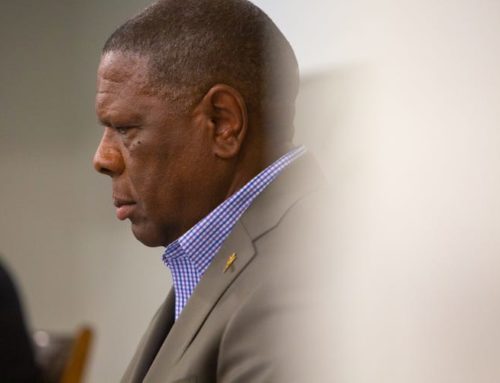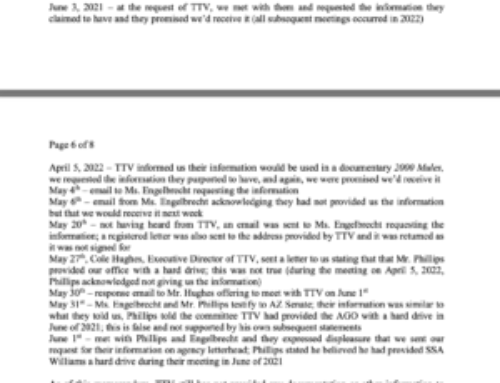This post was originally published on this site
The future of policing in Des Moines is on the ballot this November as candidates for Des Moines City Council each campaign on various proposals — some similar in nature — they’d like to see enacted for the city’s police department.
In 2020, the murder of George Floyd, a Black man, at the hands of a white Minneapolis police officer sparked mass social justice protests nationwide. Calls to increase police accountability and defund local police departments caused major cities like Austin, Portland, Louisville and more to take action.
Last summer, the Des Moines City Council unanimously passed an ordinance that banned racial profiling and mandated additional police training on de-escalation, cultural diversity, cultural competency and implicit bias, while also mandating that officers have a duty to intervene when witnessing “unreasonable force” by another officer.

Community activists and local organizations like the Iowa-Nebraska chapter of the NAACP, the ACLU of Iowa and Iowa Citizens for Community Improvement have previously said that the ordinance was a good first step, but that more needs to be done.
More than a year later, with three city council seats up for grabs, the eight candidates in the race are pushing platforms that include various proposals for the Des Moines Police Department’s future, from reallocating the department’s funds to creating opportunities for greater oversight, relocating services outside the department and more.
Citizen police oversight committee
Most commonly across several candidates is the support for a community oversight committee for the department.
In addition to a ban on racial profiling last year, the Iowa-Nebraska NAACP joined numerous community activists and other community organizations in calling for a civilian review board. The proposal was not part of the final ordinance passed by city council.
More:When it comes to bolstering police oversight, here are Des Moines’ options
Russell Lovell, the co-chair of the Iowa-Nebraska NAACP’s Legal Redress Committee, told the Des Moines Register last summer that the NAACP was advocating for a civilian review board that would do the following:
- Give communities a direct say in police practices.
- Publish enforcement and demographic data.
- Make that data accessible in different ways.
- Find adequate ways to store the data.
- Ensure that the police department’s core values matched the community’s.
- Seek public input when police make decisions on resource allocation or hiring.
Candidates who said they would support the implementation of an oversight board included Ward 3 and at-large incumbents Josh Mandelbaum and Connie Boesen, along with candidates Marcus Coenen, Justyn Lewis and Brandi Webber.
Additionally, Lewis said he wants to see a civilian oversight committee in Des Moines have the power to subpoena documents and pull data from the police department for internal investigations.
“Before a decision is made from self-investigation, the board can give a suggestion and then also go public with their findings,” Lewis said.
Incumbents Mandelbaum and Boesen say they would be in support of an oversight review board, but warned that state law pre-empts what powers a review board could have. As a result, both incumbents say they would want to see what possibilities are available to the city within those parameters.
“That (independent review board) provides some independence and some accountability and I think we should be looking to do more of that,” Mandelbaum said.
Coenen, a Ward 1 candidate, said he would also want to see the community involved in the process of creating an oversight committee to make sure it’s what the city needs.
“The biggest thing, for me, is I want to make sure that there’s … pretty wide access to data about how policing is done in the city,” Coenen said. “(Like,) the stops that are occurring, all calls that are occurring and the results of those, but also information about what’s happening within the police department.”
Ward 1 incumbent Bill Gray told the Register’s editorial board in an interview that although he would support the creation of such a committee, he would be a follower and not a leader on the issue.
Ward 3 candidate Cory McAnelly didn’t say, explicitly, whether he would support a civilian oversight committee but told the Register’s editorial board that the city should bring everyone to the table, including residents, neighborhood associations and community organizers to figure out what’s best for the city.
“I don’t hear anybody saying that it’s a bad idea … I don’t even hear police, necessarily, saying it’s a bad idea … but from the proponents, what I have heard is there’s a right way do it and a wrong way to do it,” McAnelly said.
The only candidate vocally outspoken against creating such a committee is Ward 1 candidate Indira Sheumaker. Although Sheumaker supports various police department proposals, she says state law doesn’t allow oversight committees to have any true ability to oversee or otherwise hold police departments accountable.
“It wouldn’t have the power to make actual changes to employment, it wouldn’t have power in hiring, firing, policy … anything.” Sheumaker said. “I am not in support of creating something like that to think that the problem is solved.”
Redirecting funds and services from police department
About $74.2 million, or 38% of the city’s general fund, is currently allocated toward the Des Moines Police Department, more than any other city department.
Social justice activists locally and nationwide have called for the defunding of local police departments and the redirection of those tax dollars to instead fund social programs that support mental health and affordable housing initiatives.
More:What does ‘defund the police’ mean and why some say ‘reform’ is not enough
The candidate field varies when it comes to the implementation of “defunding the police” and what it means for the city of Des Moines.
Sheumaker and Webber have both been outspoken for not only redirecting police funding into social programs but also pushing for a future where the Des Moines Police Department would eventually become obsolete.
“I want to be creating a public safety system in Des Moines that’s from the community, is built into the community, and is focused on transformative and restorative justice, that is designed to lessen interaction between residents and police,” Sheumaker said.
In an interview with the Register’s editorial board, Webber shared various ideas to lessen the police’s responsibilities, bringing some of the burdens they currently shoulder outside the police department. One such proposal includes implementing a new traffic enforcement department, located outside the police department.
Webber said those traffic enforcers and monitors would not have the ability to search vehicles or run background checks on drivers and would not carry any weapons.
“If you are a person of color, you automatically know that (police) are more likely to target you. So if we take away the traffic enforcers’ ability to do much other than enforce traffic, then we take away that potential police encounter, and therefore are protecting our minority citizens,” Webber said.
Social programs that direct mental health crisis calls to mental health professionals instead of police are also popular among all of the candidates for city council.
The city recently allocated additional funding to hire more staff to the department’s mental health crisis team — previously, Boesen said, the department had just one officer trained to deal with residents experiencing a mental health crisis.
With the addition of more officers trained in responding to mental health issues, the goal would be to convert the department’s mental health crisis team into one that operates 24 hours a day.
“I think that a lot of these social issues need to be dealt with in a different way than having police intervention … so things that, if you can help people work through their issues … I think it’s just a better way for everyone,” Boesen said.
Other candidates want to see a mental health crisis unit that operates independently from the police department, using Eugene, Oregon’s Crisis Assistance Helping Out On The Streets (CAHOOTS) program as a model.
“Communities from Denver to Austin to everywhere in between have been starting or implementing programs to respond to more calls with mental health professionals or social workers, and that’s something that we should be doing, as well,” Mandelbaum said. “I think the key path there is, first, it’s just providing the resources for the mental health professionals and the folks that you need (in) dispatch to identify the calls and get those programs off the ground.”
“I absolutely support better funding for mental health and other social service types of resources that reduce the number of those types of calls to the police department,” Coenen said. “In my mind, it’s a little irresponsible, from a city-side perspective, to try to rely on one department to achieve such a broad brushstroke.”
Cure Violence, a third-party program approved by the council in February, would achieve another step in outsourcing services from the police department into the community.
The program, which is currently in the RFP process, would employ several “violence interrupters” who would be embedded in the community to anticipate violence in targeted areas, mediate conflict and prevent retaliation.
In two years, the program, which has a projected operating cost of about $400,000, would need additional funding from the city in order to continue beyond what’s already been budgeted.
Several candidates expressed interest in continuing support for the program, which is expected to get started by the end of the year.
Boesen and Mandelbaum have each expressed support for the program, as both incumbents voted to approve funding for it earlier this year.
Coenen also expressed support for the program, while cautioning that he’d want see data and metrics on the program’s success after it’s implemented before agreeing to allocating it future funding.
Sheumaker said she, too, supports the program but would want to see how much police would be involved with the inner workings of the program.
Although Webber was not immediately familiar with the program, she said she looked forward to learning more about the program and its leadership.
“It’s really important to ensure that the programs we are funding … paying for, as a city, are being done by the right type of people,” Webber said.
Lewis, who was also not immediately familiar with the program, told the Register’s editorial board that the program seemed like “a great structure that needs to be created.”
McAnelly didn’t specify in his meeting with the Register’s editorial board whether or not he supports the Cure Violence program. He called the implementation of the program “reactive” and wants to see more data on the program.
“I don’t know, when I look at it, if it’s the right solution … if I get in there and I get the data and the information and there’s real hard data and support from the neighborhoods … then yeah, I’m on board,” McAnelly said. “This RFP process will tell, right?”
Melody Mercado covers Des Moines city government for the Register. Reach her at [email protected] or Twitter @melodymercadotv.



